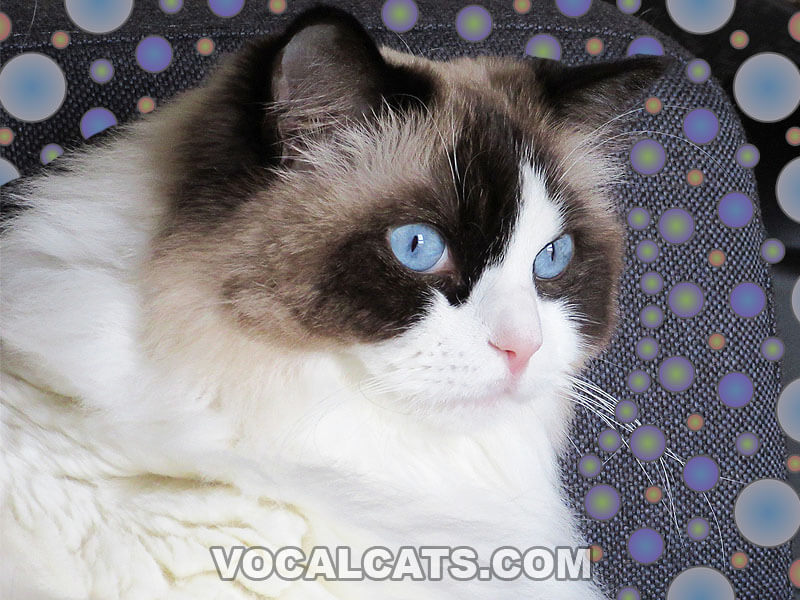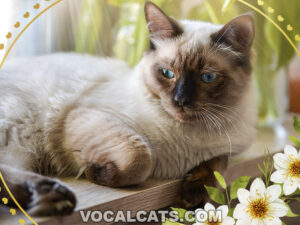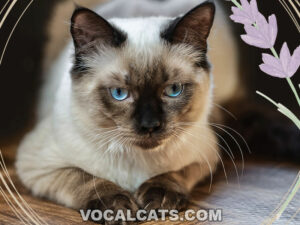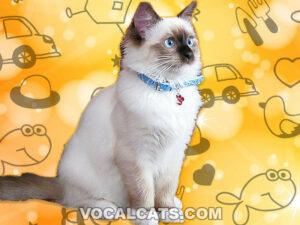One of the three recognized coat patterns of the Ragdoll is the bicolor, aside from the colorpoint and the mitted. The coat pattern of the Ragdoll is mainly categorized by the markings of the points in their extremities.
In this comprehensive guide, we will discuss everything you need to know about the Seal Bicolor Ragdoll including what makes its markings different from other Ragdolls (such as the Seal Point Ragdoll). We will also go over their temperament and personality, ways to take care of them, and tips on how to find the right breeder if you are thinking of buying or adopting one.
Contents
- Seal Bicolor Ragdoll: Breed overview
- What is a Seal Bicolor Ragdoll? What does “Seal Bicolor” mean in Ragdolls?
- Seal Bicolor Ragdoll physical appearance
- Seal Bicolor Ragdoll genetics
- Are Seal Bicolor Ragdolls rare?
- Seal Bicolor Ragdoll color progression
- Various Seal Bicolor Ragdoll colors and patterns
- Seal Bi color Ragdoll size, height, and weight
- Seal Bicolor Ragdoll personality and temperament
- Seal Bi color Ragdoll training
- Seal Bi color Ragdoll exercise requirement
- Seal Bi color Ragdoll grooming and cleaning
- Seal Bicolor Ragdoll food and diet
- Seal Bicolor Ragdoll health issues
- Seal Bicolor Ragdoll lifespan
- Seal Bicolor Ragdoll breeders
- Seal Bicolor Ragdoll kitten
- Seal Bicolor Ragdoll price
- Places to find Seal Bicolor Ragdoll kittens for sale
- Finding a healthy Seal Bicolor Ragdoll for sale
- Seal Bicolor Ragdoll: Pros and Cons
- Is the Seal Bicolor Ragdoll right for me?
- Related Questions
Seal Bicolor Ragdoll: Breed overview
| Other names | Ragdoll Seal Bicolor |
| Size | Large |
| Weight | 15 – 20 pounds |
| Height | 9 – 11 inches |
| Coat Colors | Dark brown, Light brown, White |
| Child Friendliness | High |
| Feline Friendliness | High |
| Training Difficulty | Moderate |
| Grooming Upkeep | Moderate – High |
| Exercise Needs | Low- Moderate |
| Health | Moderate |
| Lifespan | 12 – 16 years |
| Kitty Costs | $800 – $2,000 |
What is a Seal Bicolor Ragdoll? What does “Seal Bicolor” mean in Ragdolls?
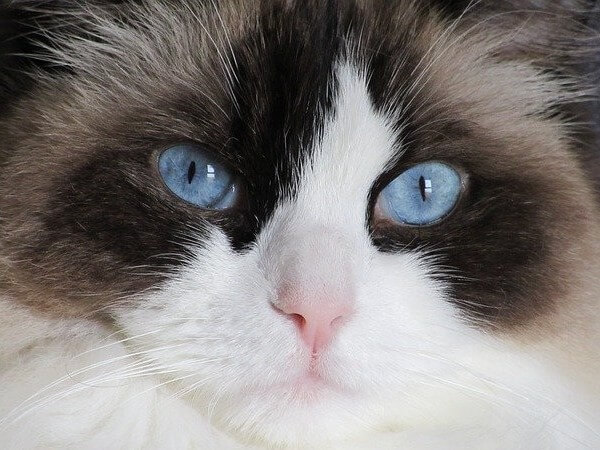
Seal Bicolor Ragdoll is a color and coat variation of the Ragdoll with seal points on the face, ears, and tail. The points on the face are interrupted by an inverted white ‘V.’ There is also color on their back or ‘saddle’ area, while their legs, feet, chin, and chest are white.
“Seal Bicolor” means that their points are dark brown or seal, while ‘bicolor’ refers to the pattern of the dark coloring of the points.
Bicolor is also one of the recognized patterns of the Ragdoll along with the Colorpoint and the Mitted.
Seal Bicolor Ragdoll physical appearance
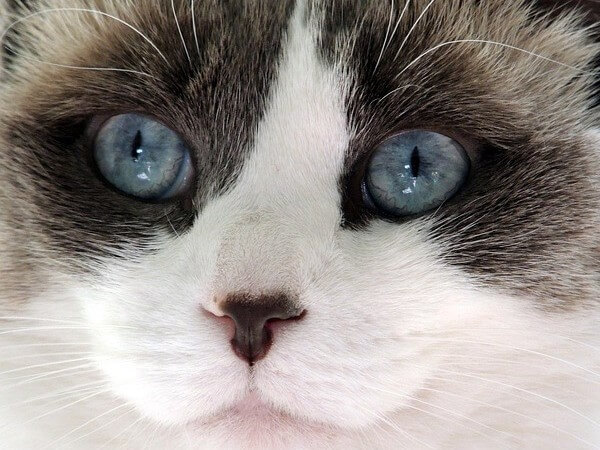
Seal bi color resembles most Ragdolls except for their color and coat pattern. They have long, rectangular bodies with broad chests and proportional legs. The head is wide and the tail is long and bushy.
The head is broad with large, round, blue eyes, and widely spaced ears.
The muzzle is rounded and the neck is short. The nose and paw pads are typically pink.
The coat consists of a single layer of guard hairs which are moderately long and fluffy.
Dark brown points are found on the ears, tail, saddle, and face which is interrupted by a white inverted ‘V’ shape. The legs, feet, chin, chest, and belly are white.
RECOMMENDED: White Ragdoll Cat (Complete Guide)
Seal Bicolor Ragdoll genetics
Ragdolls, in general, carry a gene that affects melanin production in their coat. This gene is temperature-sensitive, meaning it produces more melanin in areas where it is cooler, like in the extremities.
Another set of genes determines the color and dilution of that color, whether it is seal, chocolate, flame, blue, cream, or lilac. Seal, or dark brown, is caused by two (2) dominant genes – one for the dark brown color and another one for no dilution whatsoever.
RELATED: Flame Point Ragdoll (Complete Guide)
To make things more complicated, there is another set of genes that determine coat patterns and the ‘white spotting’ gene is the one responsible for this. Different combinations of the ‘white spotting’ gene will produce the colorpoint, mitted, or bicolor patterns.
READ NEXT: Lilac Ragdoll (Complete Guide)
Are Seal Bicolor Ragdolls rare?
No, Seal Bicolor Ragdolls are not rare. The seal color is a dominant gene making it the most common color among Ragdolls.
Seal Bicolor Ragdoll color progression
All Ragdoll cat Seal Bicolor is born white. A very light brown color in their points will start to show at around 2 weeks of age and will reach their full color to brownish-black until they are 2 to 4 years old.
Various Seal Bicolor Ragdoll colors and patterns
Bicolor Ragdolls can be divided into four (4) varieties, namely, the following:
- True Bicolor.
- High Mitted.
- Mid High White.
- High White or Van.
As we can see, Seal Bicolor Ragdoll cat can come in these four (4) varieties, plus the added varieties of tortoiseshell and lynx.
A true Bicolor Seal Ragdoll will have dark brown points on the ears, tail, and face, which is interrupted with an inverted white ‘V.’ There is also a solid-colored ‘saddle’ on the back.
Mid High White Seal Ragdoll is the same as the True Bicolor except that the saddle is broken up with a white patch.
High Mitted, on the other hand, has a bigger mask on the face with a smaller inverted ‘V’ compared to the True Bicolor.
Both these varieties are not accepted as breed standards.
And finally, the High White or van only has points on the ears, tail, and face which is interrupted by an inverted ‘V.’
DON’T MISS: Seal Mitted Ragdoll (Complete Guide)
Seal lynx Bicolor Ragdoll
Seal Lynx Bicolor has points that have the tabby pattern. Ragdoll Seal Lynx Bicolor has the distinguishable ‘M’ pencil stripe pattern of light and dark colors on the forehead. The saddle in the Seal Lynx Bicolor Ragdoll cat can also exhibit a tabby pattern.
Like all bicolors, Seal Lynx point Bicolor Ragdoll will have the white inverted ‘V’ pattern on the front of the face. The nose leather and paw pads of Ragdoll Seal Bicolor Lynx are pink. Seal Tabby Bicolor Ragdoll will also have a thumbprint of paler hairs on the ears.
Seal Lynx Bicolor Ragdoll kitten is born white and will develop color as they age.
Seal Bicolor Lynx Ragdoll can also come in the four (4) varieties of bicolors as discussed above.
You may also be interested in: Ragdoll Tabby Mix (Complete Guide)
Seal mink Bicolor Ragdoll
Seal Bicolor Mink Ragdoll has a darker and thicker body coat color compared to the traditional bicolor Ragdoll. They are not born white, but with a light color that will darken even more as they mature.
Seal mink lynx Bicolor Ragdoll
Seal mink lynx Bicolor Ragdoll is the same as the Seal Mink bicolor except for their tabby points.
Seal point Bicolor Ragdoll
Ragdoll Seal Point Bicolor is another term for Seal Bicolor Ragdoll. The term ‘point’ in a Bicolor Seal Point Ragdoll just refers to the dark color found in the extremities of Ragdolls.
The body coat of a Seal point Bicolor Ragdoll cat is lighter than their points and can vary from each Ragdoll Bicolor Seal Point.
Seal sepia Bicolor Ragdoll
Seal sepia Bicolor Ragdoll has a dark brown body coat with brownish-black points.
Don’t miss: Sepia Ragdoll (Complete Guide)
Seal tortie Bicolor Ragdoll
Seal Bicolor Tortie Ragdoll has a cream to light brown body coat that goes lighter on the chest and stomach. The points are dark brown that is mottled with red or cream. They are typically female due to the red and brown colors being carried separately by the two X chromosomes.
ALSO READ: Red Ragdoll Cat (Complete Guide)
Blue Seal Bicolor Ragdoll
Blue Seal Bicolor Ragdoll has a light gray body color and dark seal points.
RELATED: Blue Ragdoll Cat (Complete Guide)
Seal Bicolor mitted Ragdoll
Seal Mitted Bicolor Ragdoll or Seal High Mitted Bicolor Ragdoll has dark brown points on the ears, tail, saddle, and face with a smaller white inverted ‘V.’ They have white fur on their front legs that can reach mid-thigh and light brown coloring on the top of their legs.
Seal Bi color Ragdoll size, height, and weight
Seal Ragdoll Bicolor will grow in spurts until they reach their full size by the age of 4 years old.
| Height | Weight | Length | |
| Male | 9 – 11 inches | 15 – 20 pounds | 17 – 21 inches |
| Female | 7 – 9 inches | 18 – 19 pounds | 17 – 19 inches |
Seal Bicolor Ragdoll personality and temperament
A Bicolor Seal Ragdoll wouldn’t be called ‘puppy-cats’ had it not been for their sweet and gentle personalities.
Their welcoming demeanor is a great blessing if you have small children and other pets.
Seal Bicolor Ragdolls simply love human companionship to the extent that it is not unusual to see them ‘stalking’ you around the house as a way of showing affection.
Also, Seal Bicolor Ragdolls have absolutely no aggressive bone in their body, hence, they are one of the best when it comes to a cat’s temperament.
Seal Bi color Ragdoll training
You’d be surprised, but yes, you can teach a Ragdoll Bicolor Seal without too much effort. He is smart and will learn cat tricks and litter training in a snap. Just make sure to praise him if he got it right and keep the cat trick training sessions short.
Seal Bi color Ragdoll exercise requirement
Great news for cat lovers who do not have the luxury of time to exercise their feline companions because a Seal Bi color Ragdoll does not need a demanding form of physical activity.
Go play hide-and-seek or a game of fetch because those are enough physical activities for a Seal Bi color Ragdoll.
Seal Bi color Ragdoll grooming and cleaning
A long-haired cat like a Seal Bi color Ragdoll needs to be brushed at least 3 to 4 times a week. Take your time to brush the fur under his ears and on the belly because these are areas where mats usually form.
You can use different kinds of a brush to achieve smoothness like a de-shedding brush, a slicker brush, and a rubber brush glove.
When it comes to bathing your Seal Bicolor Ragdoll, you can bathe him once a month with a gentle-formula cat shampoo.
Here’s a grooming table to help guide you with the grooming needs of a Seal Bi color Ragdoll.
| Grooming Needs | Grooming Frequency |
| Hair Brushing | 3 – 4x weekly. |
| Nail Trimming | As needed. |
| Teeth Brushing | 2 -3x weekly. |
| Bathing | Once a month. |
| Eye Care | Check weekly. |
| Ear Care | Check weekly. |
Seal Bicolor Ragdoll food and diet
A proportion of ½ to ¾ cup of canned high-quality cat food is the best for a Seal Bicolor Ragdoll.
Seal Bicolor Ragdoll health issues
Though generally healthy, a Seal Bicolor Ragdoll may still be plagued with genetic problems such as these three (3):
1. Polycystic Kidney Disease
The affected kittens are born with tiny cysts in the kidneys that get larger with age. There is not much you can do except to encourage him to drink a lot of water and adjust his diet accordingly.
2. Hypertrophic Cardiomyopathy
A heart condition, hypertrophic cardiomyopathy can cause the thickening of the heart muscles. A low-sodium diet is one way to manage this condition.
3. Feline Obesity
Due to the lazy nature of Seal Bicolor Ragdolls, they easily gain weight that may, later on, escalate to complicated problems like diabetes, arthritis, and heart issues.
Seal Bicolor Ragdoll lifespan
You can expect your Seal Bicolor Ragdoll to live an average of 12 to 16 years.
Seal Bicolor Ragdoll breeders
A Seal Bicolor kitten is no doubt one of the most expensive cat breeds on the market. For some of you on a tight budget, a good alternative would be to adopt from rescue centers. If you’re thinking about buying from a pet store, you’ll want to think twice.
Kittens from pet stores may have health issues due to unscrupulous breeders who may have bred the mother cats constantly without letting her rest or without performing any screening for health diseases.
Cats in pet stores are usually denied basic veterinary care, clean water, and well-balanced and nutritious food. They’re stuck in crowded wired cages that are often filthy and unsanitary.
It should be mentioned that responsible, ethical, and reputable breeders usually have a long waiting list for their kittens and they will never sell their precious kittens in pet stores.
Here is a list of what to look for in a responsible breeder:
- They have websites that indicate which cat associations (TICA, CFA) they are members of and you can also read the reviews of their past patrons.
- They do not cage their kittens, thus, buyers are assured of good socialization skills.
- The kittens have been DNA tested and health-checked for gene-related issues.
Seal Bicolor Ragdoll kitten
Once you’ve made up your mind to bring home a Ragdoll Seal Bicolor kitten, there are things you will need to prepare and you’ll definitely need to kitten proof your home.
Seal Point Bicolor Ragdoll kittens belong to the large cat category, meaning, you have to purchase a bigger cat carrier and bed for them to be comfortable.
The other basic supplies include food and water bowls, collar, harness, and cat toys.
Of course, microchipping is essential as well as his regular trips to the veterinary clinic to stay healthy.
Seal Bicolor Ragdoll price
For pet-quality Seal Point Ragdoll, it is about $800 while an average of $2,000 for show quality.
If this is too much, a good alternative is to get one at an adoption or rescue centers near you.
Places to find Seal Bicolor Ragdoll kittens for sale
We’ve located ethical breeders who might have Seal point Bicolor Ragdoll kittens for sale. If the kittens are currently unavailable, don’t worry. Email, call, or fill out an application in order to be placed under the waitlist category.
For now, here are two breeders that may have Seal Bicolor Ragdoll kittens for sale:
East Coast Ragdolls (eastcoastragdolls.com) was given an award of excellence in 2022 by the The International Cat Association, Inc. (TICA).
Ravera Ragdoll (raveraragdolls.com/Kittens.htm) is located in Australia and they are a trusted site to find Seal Bicolor Ragdoll kittens that have been DNA-tested and are proven negative in diseases such as polycystic kidney disease.
Finding a healthy Seal Bicolor Ragdoll for sale
Adult Ragdolls are just as affectionate and playful as kittens. Here are two (2) places where you can get healthy Ragdoll cats.
Lionsroyale (lionsroyale.com/ragdoll-adults-available) in Ontario, Canada has adult Ragdolls for sale as well as adult Ragdolls available for adoption. You can contact the breeder through the email address provided on their website.
Masterpiece Ragdolls (masterpieceragdolls.com/kittens) has retired Ragdolls for sale. There’s a reservation form that you can fill out and submit online.
Seal Bicolor Ragdoll: Pros and Cons
In summary, here’s what to expect from a Seal Bicolor Ragdoll.
| Pros | Cons |
| Relaxed / laid-back personality. | Has separation anxiety problem. |
| Great pet for playful kids. | Vulnerable to genetic related diseases. |
| Can live in harmony with other pets. | Tends to gain weight. |
| Only requires light forms of exercise. | Requires to be groomed frequently. |
| Playful and funny. | Not hypoallergenic. |
| Not aggressive. | Should not be allowed to go out alone due to a lack of self-defense instinct. |
Is the Seal Bicolor Ragdoll right for me?
A Seal Bicolor has no problem getting along well with everyone. If ever there is an issue, that is his low tolerance for alone time. So, if you live work a lot or travel frequently, that could be a problem, unless, you’d bring him to a cat daycare each time you go to work or have a cat sitter.
Related Questions
Yes, Bicolor Ragdolls are more expensive because the demand for a Bicolor Ragdoll is higher compared with other colors and patterns. This is especially true in countries like the US and Australia.
The Seal Point Ragdoll is the most popular color of Ragdolls. This color is one of the official and traditional colors of Ragdolls which is characterized by having a light brown fur color and darker brown points on the extremities.
DISCLAIMER: THIS WEBSITE DOES NOT PROVIDE MEDICAL ADVICE
The information, including but not limited to, text, graphics, images and other material contained on this website are for informational purposes only. No material on this site is intended to be a substitute for professional veterinary advice, diagnosis, or treatment. Always seek the advice of your veterinarian or other qualified health care provider with any questions you may have regarding a medical condition.
Resources:
https://en.wikipedia.org/wiki/Ragdoll
https://pubmed.ncbi.nlm.nih.gov/34822642/
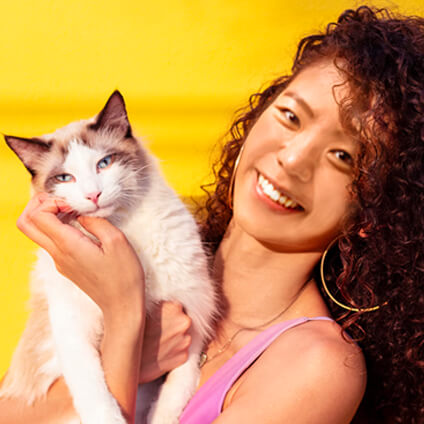
With over five years of specialized experience as an animal writer, my expertise lies in cat nutrition, health, behavior, grooming, and training. I am dedicated to delivering helpful and informative content that caters to the well-being of our feline friends. My primary goal is to empower pet owners with knowledge and ensure our feline companions thrive in health and happiness. In my free time, I love volunteering at local cat rescue centers.
